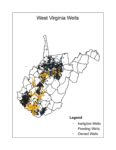1. Get ready now! The driller will send you a copy of his drilling permit application with the well site and access roads already selected and surveyed less than 15 days before the permit can issue. Or you might happen to see the surveyor on you land. That is not enough time to get educated. Read our short advice web page. Get a copy of the West Virginia Surface Owners Guide to Oil and Gas and read its updates on the web site.
2. Do not sign an agreement for a horizontal gas well site. Just because the driller/mineral owner has the right to use your surface to produce the minerals under you, does not mean that they have the right to use your surface to produce gas from neighboring mineral tracts. Do not let them tell you different. If you do decide to let them use your surface, get paid well – $25,000 per horizontal well maybe.
3. Buy any % of ownership of the minerals under you that you can. If no lease has yet been signed, and if you can own some interest in the minerals under you no matter how small, then they cannot drill on your property unless you also sign a lease. Even if a lease has been signed, some day in the future they may need a new lease or an amendment and whoever lives there will thank you.
4. Drill a water well. They cannot drill a gas well within 200 feet of a water well. If you have a spot you want to use some day for a home site, drill the water well now , and anywhere else that you want to protect for future use.
5. Negotiate for the mineral owner. If you know who the mineral owner is, ask them to let you help in negotiations. Tell them you are willing to do the leg work to find out what other offers are out there and what lease provisions can be put in to help them and you. As them to give you something in exchange, like the right to consent to well and road locations or even 1% of the royalty.
6. Keep a journal. When things start happening they will happen fast and you will find it very difficult to remember who you talked to on what day and who they worked for and what their title was.
7. Don’t get mad, ask for a supervisor. If you are having trouble with a particular industry employee do not get hostile. They will use it against you later. Instead very patiently and repeatedly ask for the name of their boss. If the troublesome employee will not give you the name, say good bye and get on the Internet and find the company’s web site and call the president’s office. Ask the president of the company the name of his supervisor and work your way down until you get the supervisor. You will be more successful causing problems for the person you are having trouble with then continuing to deal with them directly.
8. Take pictures. A picture is worth more than 1000 words. Did you ever try to argue that a picture does not show what it shows? Take lots of pictures. Take some from close up, but take some from far back. Take them from this way and that way. The new digital cameras are great. You do not even have to print them. Just keep them in case you need them.
9. Agree to have your water well tested. Before they drill they are required to offer to test water sources and supplies within 1000 feet of the where the gas well will enter the ground. If you are not within 1000 feet, ask them to test yours anyway. If your well goes bad because of the drilling and you do not have a test before they drilled, then they are sure to say that your well was bad before they drilled. And you will be stuck proving different. You may want to have the testing done yourself, and you may want to test for more parameters than they are required to test, but you will have to pay for that.
See our list of water testers. And here are Penn State water parameters.to consider.”
10. Join the West Virginia Surface Owners’ Rights Organization. Help support this web site and our education and advocacy for surface owners. Many of our members also own their minerals. Once you sign a lease you are a surface owner.




